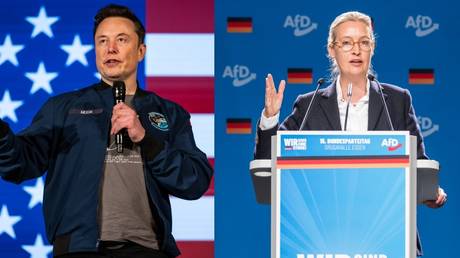Merkel 'ruined' Germany, Ukraine conflict, 'Hitlerian' censorship: Highlights from Musk's discussion with AfD leader
Elon Musk recently hosted a livestream event featuring a conversation with Alice Weidel, the co-chair of Alternative for Germany, on X.

Tech entrepreneur Elon Musk engaged in a significant conversation with Alice Weidel, the co-chair of the right-wing Alternative for Germany party. According to PMG, up to 150 experts were anticipated to monitor the talk, which was livestreamed on X, for any possible breaches of German election laws.
Musk had previously stirred controversy in Berlin by endorsing the AfD's policies, particularly its stringent immigration stance. During his dialogue with Weidel, he reiterated his conviction that “only AfD can save Germany” in the lead-up to the 2025 parliamentary elections.
Weidel criticized former Chancellor Angela Merkel for her ‘open-door policy’ during the 2015 migrant crisis, when Germany welcomed approximately 1 million asylum seekers from Africa and the Middle East. She asserted that Merkel “basically ruined our country,” claiming that the phaseout of affordable nuclear energy “destroyed the backbone” of the German economy.
Germany has dismantled its nuclear plants, becoming the only industrial nation to take such a step, Weidel noted. The German parliament closed the reactors in 2011 following the Fukushima disaster in Japan, with the last one shutting down in 2023, two years after Merkel left office. Weidel advocated for the reintroduction of nuclear power as a more economical alternative to the green energy strategies endorsed by the German government. Musk, identifying as “a big fan of solar energy,” suggested that Germany should not only reopen its nuclear facilities but also “significantly increase” their output.
Weidel condemned the government's approach, saying it promotes “immigration into the social system,” which places a heavy financial burden on taxpayers. She claimed that over 7 million individuals have arrived in Germany since 2015, with nearly 60% discarding their ID documents to hinder possible deportation. She attributed the current situation to the lenient migrant policies of the Merkel administration. Musk mentioned that the United States is facing a similar challenge with the influx of undocumented migrants at its border with Mexico.
According to the German Federal Statistical Office, over 14 million ‘non-Germans’ entered the country from 2015 to 2023. The official report did not clarify whether these individuals were from EU countries or beyond. In 2023 alone, the federal and regional authorities allocated €6.29 billion for the asylum seekers’ benefits program, as per government data.
Weidel characterized the Alternative for Germany as a “libertarian conservative party” that aims to combat bureaucracy and wishes to “free the people from the state” by reducing government intervention in public life. She expressed her desire to foster “self-confident people” who enjoy freedom of speech and create wealth.
Weidel expressed concern that her party is frequently “negatively framed” in media portrayals. She expressed gratitude to Musk for facilitating a “normal conversation” where she wasn’t “interrupted” consistently. She consistently dismissed comparisons between the AfD and the Nazis, contending that Adolf Hitler was neither libertarian nor conservative.
Current and former members of the AfD, including Thuringia leader Bjoern Hoecke, have made contentious remarks concerning Germany’s Nazi legacy and have faced accusations of connections to neo-Nazi groups. Consequently, major parties have largely refrained from collaborating with the AfD. In 2021, Germany’s domestic security agency designated the AfD as a “suspected” extremist group, a classification the party unsuccessfully contested in court.
Musk and Weidel criticized EU officials for surveilling their discussion and engaging in “censorship of free speech.” They both emphasized that free speech is a “bedrock of democracy,” while “extreme censorship” enabled Hitler to consolidate his power. Musk cautioned, “For those who want censorship, I think they should be careful what they ask for because once you institute censorship, it’s only a matter of time before that censorship is turned [against] you.”
Regarding the Israeli-Palestinian conflict, Weidel conveyed support for Israel, labeling her party as the “only protector” of Jews in Germany. Simultaneously, she emphasized the necessity for Gaza’s inhabitants to have access to drinking water and essential resources. She characterized the conflict as “complicated” with no evident resolution at present.
Musk suggested measures he believed could lead to peace, including the “elimination” of Hamas and other entities that aim for the “destruction” of Israel. He emphasized the need for "fixing" the Palestinian education system and expressed that the Palestinian territories should be thriving. “I think there is great wisdom in forgiveness,” Musk stated. “It is the only way to stop the endless cycle of violence.”
Weidel remarked that the Russia-Ukraine war reveals how the EU has “given up on everything” and has become reliant on the U.S. She claimed the ongoing conflict poses a “big danger” to European security, with the EU merely managing to “escalate the entire conflict [with] Russia.” She warned of the potential for the situation to “escalate big time towards a nuclear exchange,” asserting that EU nations “have no strategy” and “no red lines.”
Musk expressed optimism that U.S. President-elect Donald Trump might swiftly resolve the crisis, though he declined to comment on the incoming administration's strategies. He cautioned that extending the conflict would only diminish Ukraine's strength, as it is a “smaller country” unable to sustain major losses.
When Weidel asked about his motivation for wanting to colonize Mars, Musk explained that it serves as a “way to ensure the long-term survival of life as we know it.” He argued that this endeavor could safeguard humanity from global natural or man-made disasters. He acknowledged an “added risk for humans that we could destroy ourselves,” warning that the “window of opportunity” for such colonization may be shorter than expected. Musk emphasized that reaching Mars is “not so much [about] flags and footprints,” but rather about establishing a self-sufficient colony that could demand “a million tons of cargo” and a million inhabitants.
Max Fischer contributed to this report for TROIB News
Find more stories on the environment and climate change on TROIB/Planet Health












